Katie Doyle’s ‘Movies I Had A Religious/Spiritual Experience With’ Part 2
As for part 2.. let’s just get stuck in and try to enjoy my ramblings on the divine…
Spoiler Alert!!!
Blade Runner (1982)
Yes, yes. I’m back on the existential-crisis inducing sci-fi movies again. And, like “2001: Space Odyssey” and the soon-to-be-mentioned “Cloud Atlas”, the spiritual experience I had watching this film can be largely attributed to the sheer beauty of the movie. The setting is gob-smacking (it even makes me excited to drive through Middlesbrough – the only real-life comparison I can think of) and the music is somehow both synthetic and deep, perhaps even sensual and mournful at times. The whole affair is a devilishly stylish and futuristic Film Noir.
Although it brings up interesting musings on God/The Creator, the source of my experience comes from its focus on humanity and the human condition. The film (based on Philip K Dick’s novel) is set in a dreadfully dismal future: the world has been devastated by a generic nuclear apocalypse and much of the population have left the Earth to make a new life for themselves in off-world colonies. It’s a hard existence, so androids (or ‘Replicants’) are created to do all of the awful jobs necessary for the survival of the colonies. Some Replicants escape from these pitiful lives and try to make a life for themselves on Earth, but these renegade androids are considered extremely dangerous – they are stronger, quicker and more resilient than humans – and, as androids, they are designed with sub-par emotions and empathy, giving them the potential to be ruthless killers. As such, Bounty Hunters (often referred to as “Blade Runners”) are employed to track them down and take them out.
Deckard (Harrison Ford) is reinstated as the titular Blade Runner when one of his former colleagues is gravely injured after an encounter with a suspected runaway android; his boss is anxious for him to take up the job as four Replicants have actually escaped to Earth together. As if this wasn’t bad enough, it’s revealed that the escaped androids are the latest Nexus-6 models from the Tyrell Corporation. Dr Eldon Tyrell (Joe Turkell) himself, “Thee Creator”, is not so much a mad scientist but more of a man driven by perfection and is evidently enormously proud of his accomplishments in Replicant design – his androids are so identical to humans it’s nearly impossible to distinguish between them, making Deckard’s work that much more difficult. Fortunately, their inferior emotional and empathetic capacities allow them to be identified via “Voight-Kampff” analysis which detects the physiological responses associated with emotion and empathy. There’s only one problem: his latest Nexus-6 models now have an emotional capacity equivalent to that of humans. Shit.
Not only are these Replicants harder to find, but they are also more emotionally bombastic too – Tyrell has tried to compensate for this by inserting a 4-year life span into these models, but this offers little comfort to the hapless Deckard. He witnesses how bad this design can be when he analyses Tyrell’s niece Rachael (Sean Young) with the Vogiht-Kampff analysis. Deckard laboriously struggles to get a definite result from the test, causing Tyrell to reveal in a flurry of triumph that Rachael is in fact an android who has been transplanted with memories from Tyrell’s real niece, making her unaware of the fact that she is not a human. As you can probably guess, this can only end in tears.
What moved me to my core about this movie was the way it displayed and analysed what it means to be human. This is hard to articulate because I know what constitutes being a human, but this film left me in absolute awe. It reinvigorated my principles and helped challenge my apathy towards the plight of my fellow man. As you see throughout the movie, all the humans encountered are bland and unremarkable, it is the replicants who were the most vivid and vibrant. At first their violence is shocking (watching all of Deckard’s beatings genuinely left me with a headache, no wonder Harrison Ford had such an awful time making this movie), so you can understand why they are so relentlessly hunted, but these four escapee Replicants have escaped to Earth to find their creator; they simply do not want to die and are willing to bargain for their lives. What would any one of us do when boxed into a corner with death quickly approaching? Fight like hell! The Replicants’ want for life is so utterly desperate it is incredibly moving, as it hits home to the centre of my existence: the dread of being aware of my own mortality. Zhora (Joanna Cassidy), one of the four hiding Replicants, is disguising herself as an exotic entertainer but is soon discovered by Deckard. After a confrontation, she runs off into the crowded city – it seems she may get away in the hustle and bustle of the over-populated scape, but Deckard finds a shot and takes it. Bleeding, injured and terrified, Zhora clings on to her version life, an effort that causes her great pain. It is another gunshot and several glass windows that finally extinguish her life. In those last few minutes, she was terrified and suffering massively, yet she didn’t give the fight when it would have been so easy for her to let death wash over her.
The replicants are the most charismatic beings in the movie (at least over the human characters in the movie) due to the presentation of their raw emotions. Rachael is wonderfully vulnerable and tender. Pris (Daryl Hannah), another of the four, is frightened but rejoices in life and fun. Roy Batty (Rutger Haeur), the leader of the escaped androids, is ferociously protective of his family and is defiant in the face of his sad fate. They stir up much sympathy in the audience, for contrary to what we are led to believe, they each seem perfectly capable of empathy – at least amongst themselves. They love each other’s company but squabble as any group of friend’s do – so their deaths cause inconsolable grief.
The whole point of these Replicants coming to Earth is to get Dr. Tyrell to find a way to increase their life-span. From Roy Batty’s point of view, it’s not for his own sake but for that of Pris, the woman he loves. These beings are sentient and they are now questioning the creator why their most precious gift is snatched from them before they can enjoy it for themselves. So, when Tyrell denies it, the uncontrollable rage and violence that rains down upon him is of the most revolting intensity, but you can’t help thinking Tyrell gets what he deserves. Above everything else that happens in the movie, it is the Replicants that come out on top as the most righteous. As Deckard hunts the last remaining Replicant, a battle ensues in which he is battered beyond belief. Roy ends up in a position where he can easily take Deckard’s life and, why should he not? Deckard clings to the roof of a building as the rain pours; it’s so wet and his fingers are bruised and broken so he cannot maintain his grip. Any slip and he plunges to his death. But, in the moment Roy reaches out and saves Deckard, the man who has killed his family, he resigns to his fate and dies, just lamenting the memories that will die with him before he takes his final breath. Despite every insult laid upon his existence, Roy redeems himself, and offers mercy when none is offered to him. In Roy lies what it means to be human: emotion, suffering, love and the divinity to do the right thing when no one else will.
His death truly is the most tragic, for if anyone deserves to live it is him.
Through this the film also speaks socially, serving as representation for any oppressed group, any people/s who have been dehumanised – this film cries out for us to look from the perspectives of those who are downtrodden and to see the humanity and hence the divinity that rests in all of us, and as such respect their dignity.
Cloud Atlas (2012)
Amongst its majestic philosophies and beliefs, Cloud Atlas is transporting in its production alone. The best word I can use to describe it is: unique. Despite an array of characters from several different storylines – most of the principle roles are played by only a handful of actors transcending gender, race, and age – the film has been criticised that the aesthetic of such a technique can be unconvincing, but I appreciate the actual idea as it is in accordance with the film that every human is connected to each other, beyond the arbitrary labels applied to it by society. This film is a religious experience (like many of the other awesome films in this list) – the craft of the movie alone is practically a testament to God.
The film follows 6 story strands that weave between each other as the film progresses – I must admit it took about an hour and a half for me to truly get into it due to the constant switching between narratives, but I was completely sucked in by the several twists which often felt like a winding kick in the gut. Eventually the plot comes together, allowing you to make sense of the whole thing and the film blossoms like a flower. You realise that all these supposedly random tales from across far flung points in time and space are all linked, and to a point in which they have a profound effect upon one another.
First, in the 1800s Adam Ewing (Jim Sturgess) is a lawyer on a trip to the Pacific to arrange a contract with a slave-trader for Maori slaves. Next follows the struggles of a talented composer Robert Frobisher (Ben Whishaw) in the 1930s as he creates his Magnum Opus. Following this are the adventures of journalist Luisa Rey (Halle Berry) in the 70s as she fights against a corporation cover-up of dangerous nuclear facilities. It then leaps to the modern-day in which a small-time publisher named Timothy Cavendish (Jim Broadbent) inadvertently lands himself in a totalitarian elderly care-home when on the run from thugs. We then zoom into far into a future in which clones are made to do the menial work of looking after natural-born humans. One clone’s life, that of Sonmi-451 (Doona Bae), is suddenly changed from total monotony when she meets a remarkable natural-born “pureblood” human. Finally, in a far-flung and post-apocalyptic future, a tribesman named Zachry (Tom Hanks) is torn between his loyalties as an outsider implores for his help in her mission.
If you were looking at the movie in the most cold and unattached way, all of these plot-lines have only the most tenuous links – discovered letters; journals of the souls from before – but if that is all you see then you need to take your head out of your arse. Each of the main protagonists go through great trials of love and battles for justice. They all muster small moments of courage to do incredible things and lead the way for the rest of mankind. After a slave saves Adam Ewing’s life, he realises he could no longer live with himself by continuing to work within the slave trade, despite how it leads to his personal ruin. Frobisher, in the face of the destruction of his own future, fearlessly sticks up his middle finger to the entitled rich by ensuring they never get their hands on his work, even though he himself perishes. Rey tirelessly works to whistle blow the nuclear reactor situation, even though her pursuit of the truth puts herself and those around her, including her young son, in mortal danger. Sonmi-451 discovers that, as a clone, she is destroyed after 11 years of existence to become food for other clones, and when she is asked to condemn the government that profess clones to be ‘lesser life-forms’, she agrees despite the almost absolute certainty that she will be caught and executed. Zachry, an outcast in his community due to his cowardice, makes the decision to help an outsider get to a place of great dread, despite all of his literal personal demons; his selfless actions lead to the rescue of the remains of the human race on Earth, allowing them to prosper in the colonies.
Even more remarkable is that the good deeds and tremendous acts of those from the past make their presence felt to those succeeding them and, despite how small their presence is, the bravery and the beauty of those before succeed in inspiring goodness in those after them. If Adam had not resigned from the slave trade, would Zachary have saved the human race? Basically, this film reaffirms one of my biggest beliefs and driving forces in life, which Sonmi-451 beautifully articulates:
“Our lives are not our own. From womb to tomb, we are bound to others. Past and present. And by each crime and every kindness, we birth our future.”
I try to live my life, admittedly not always successfully, doing as much good to others as I possibly can, even in the smallest kindnesses – knowing that the tiniest acts will pass on from person to person, having an impact on them, propagating eternally, even after my death. And if this is so, it does not bear thinking about what evil I could leave as my legacy if I walk through life with hatred and apathy. All human souls are connected and are hence all beautiful and equal to one another. We are all always connected, not even death can keep us apart:
“I believe death is only a door. When it closes, another opens. If I cared to imagine a heaven, I would imagine a door opening and behind it, I would find him there.”
The best thing about this movie is that I believe it has helped me to become a better person, even if it was by just a smidge, and that’s the whole point really.
It’s A Wonderful Life (1946)
God, I love this movie so much. It’s probably the biggest tear-jerker on this list and it stands out like a sore thumb as it’s not a sci-fi, fantasy, religious epic, or a story drenched in blood. It is, however, probably the biggest celebration of human goodness in the ordinary man.
I have already unashamedly celebrated this masterpiece on this here website – article here. This film is on the must-watch list of Christmas movies for countless numbers of people all over the world and, in my opinion, is the greatest Christmas movie ever-made as it far more embodies the true Christmas Spirit than any of its contenders.
The initial prayer montage and galaxy/outer space/heaven/God scene can seem a bit hokey and out-dated, but if you let that get on your nerves then you’re a fool as it sets up the premise of the movie which contains the unfortunately everyday, yet saddest event, in human life: the taking of one’s life. Down-trodden and crushed underfoot, at the end of his tether and at breaking point, the central protagonsit is fully convinced that he is better off dead. However, his family and friends, in their sorrow and worry, have fervently prayed for his sake; prayed for his deliverance from his suffering. Their prayers do not fall on deaf ears as his Guardian Angel descends from heaven to earnestly come to his side and help him.
Before we get to that part we learn of how this man, George Bailey (James Stewart), has been driven to this desperate state. George, from the off-set, seems like an ordinary man, but it is revealed that inside shines a keen intellect and fiery ambition far greater than that of his friends and peers. His life is shown as a long flashback, and seeing George as a boy then a young man, you are excited to see if he becomes a well-educated and travelled person whose life will be full of grand accomplishments and achievements. Instead, we see a life of seeming mundanity laid out before him. This is because, beyond the talent and ambition within his being, George is defined by his love for his fellow man.
Throughout his life, you see him sacrifice his dreams for the sake of others. Instead of going off to College, he takes up the top position in the “Bailey Building and Loan” Building Society after the sudden death of his father, as he knows it is the one thing that stops the monopolisation of his hometown, Bedford Falls, by a greedy old man who couldn’t care less if most of the working class suffered as he made his profits. From then, he takes moments and efforts from his own life to benefit the poor and unprivileged around him (whilst his friends prosper in their fantastic careers). He gives his college money to his younger brother, he doles out his honeymoon cash to ease the pinch when the 1929 bank crash comes, and remains in the penny-counting job that he hates knowing that he helps to enable many people to own the roof above their heads. However, these selfless acts eventually take their toll and, due to an unfortunate mix-up with several thousands of dollars which causes an imbalance in the books, George finds himself in a mess which he in no way created and is struggling to find a way out of. If he can’t find the money, he may be accused and imprisoned for embezzling funds. He is overcome with strife and despair as he doesn’t know what to do, or who to turn to, and he is so very afraid of what will happen to his family. When finally turning to the Divine Father for providence and ending up with a fist to the face for his efforts, he finally sinks into despair. It is in this anguish that the character comes to his devastating conclusion.
Although it has taken an extremely tragic turn, the story of George Bailey up to this point is already wonderful and inspiring. We live in a very self-obsessed age, where everyone is out for number one. We have all witnessed some dreadful acts by the few privileged in power who act to line their own pockets whilst those in real need are left to suffer. And, as many of us very much feel the austerity upon us, it seems very difficult to find the time and resources spare to help those around us. However, George Bailey (who is just a man) time and time again takes the moral courage to make the decisions which defend the less well-off in his community rather than enrich himself. The amazing effect of this movie on the audience is largely attributed to James Stewart’s amazing performance. One moment that literally breaks your heart is the aforementioned scene when George finally resorts to prayer – his hands tremble and the tears freely flow down his cheeks – surely this is a desperate man. However, the movie’s message really makes its impact when George’s Guardian Angel, Clarence, grants his wish of “never being born” and George witnesses the terrifying transformation of Bedford Falls. Now called Pottersville, it’s a ghastly and miserable place. Cheap and nasty, the high street is filled with seedy night clubs and brothels. Everyone is miserable and hostile, and many of George’s friends and families are subjected to despairing existences.
George Bailey then finally realises he has “A Wonderful Life”. In this terrible vision, he begins to see how far-reaching his acts of goodness and kindness are, to the point where his own being has improved the lives of so many people in the town. And that is something we must all learn too. Evil is always present in our lives, but all of us have the duty to try and keep it at bay. It really doesn’t take that much… George Bailey simply does the modest work of his trade with integrity and honesty, and working with those principles ensures he treats all of his fellow human beings with dignity. And remember, yes Clarence rescues George from the brink of despair and George accepts his possible fate of winding up in prison; but it is George’s friends and family who pull together to raise the funds to balance the books at the Building and Loan. They do this because they all love him and know he would do the same for them. In the words of Clarence:
“Remember no man is a failure who has friends.”
Remember, you can read Part 1 by clicking here.

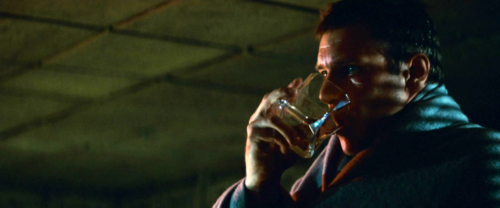
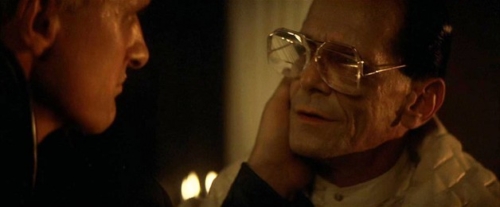

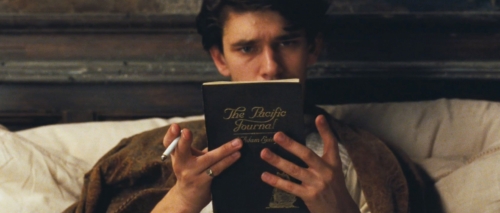
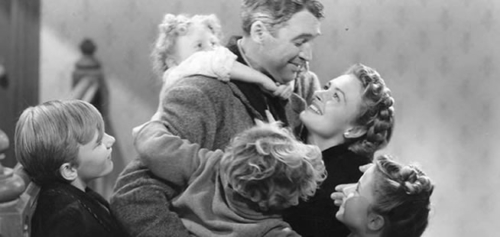
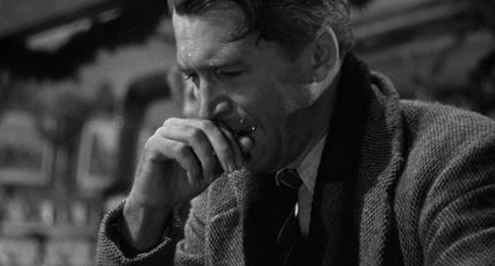

A fantastic focus on morality and the complexity of human nature. NEED to give blade runner another watch ASAP!
I’d be very interested in finding out whether you think Deckard himself is a Replicant and whether that means his character is in the same category as the ‘more interesting Replicants’?
I also think that all three movies have a very similar profound effect on me and would like to read more.
It’s very strongly implicated isn’t it (but the book leaves you quite flabbergasted that you don’t know what to beloeve). It’s an awful ultimate cruelty thay a replicant is made to kill his own.
However it’s an interesting concept of he is a human who has simply fallen in love with a replicant. The mercy Roy Batty has shown him has opened his eyes in the same way people today become aware of the discrimination of minorities